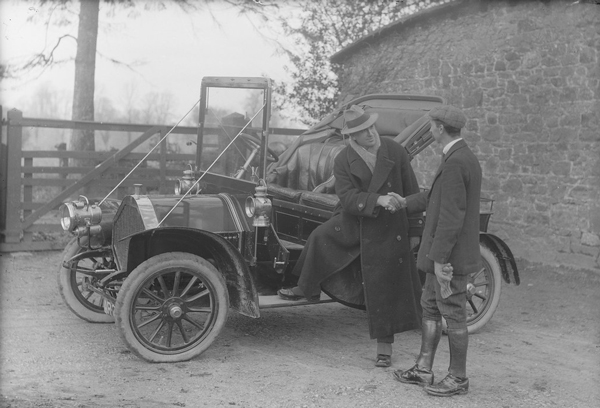“We must have money” -Cosgrave defends imposition of new duties on British Motors
Dublin 23 March, 1923 - President Cosgrave has defended the imposition of a significant new duty on the import of all motors - cars and bicycles -manufactured in Great Britain which is due to come into force on April 1st.
From that date forward the Irish Free State Commissioners of Revenue has stated that all such motors will be subject to ad valorem tax of 33 .3%. This is a situation similar to that pertaining to motor cars at present imported into Great Britain from elsewhere. It is understood that in certain cases - and subject to prescribed conditions - duty exemptions or rebates may be claimed.
The reaction of those involved in the motor trade , as well as motorists, to the Revenue’s statement was, Sir James Craig, Independent TD for Dublin University told the Dáil, a ‘panic’ and he understood that a ‘considerable number of orders’ had been cancelled on the back of the Revenue’s statement.

Pictured on his way to Dail last September, Sir James Craig TCD, who spoke in the debate on the new motor duties ( Image: Irish Life, September 1922)
However, the concerns raised on the part of the motoring trade have not impressed the President of the Executive Council who pointed out to the Dáil yesterday that motorists who pay 500 or 600 pounds for a car should make a contribution to the finances of the State. ‘We must get money from one source or other’, Mr. Cosgrave declared.
He continued:
‘We must either tax all round and fairly all round or restrict expenditure. Deputies come here repeatedly, time after time, asking for an extension of this service and of that, and some other service, but when it comes to a question of raising the money nobody can make a suggestion as to how it is to be got. Get it from somebody else is always the story.’
Nevertheless, the proposed duty has come in for stinging criticism from motor trade representatives. Mr. A. Phillips, manager of the Dublin Motor Company, has described the import tax on cars from Great Britain as ‘indefensible.’
‘What we want at present is mutual goodwill between Ireland and Great Britain commercially and otherwise, and that would not be secured by a tax such as has been mentioned. There is no justification for such a tax’, he says.
Speaking in the Dáil, Dr. Patrick McCartan said that as Ireland didn’t really manufacture cars, the tax was essentially one on the motor user - and these were not wealthy people. ‘There is nobody in Ireland who is extremely wealthy and can afford to pay large prices for cars’, Dr. McCartan remarked. ‘The users of cars in Ireland are not wealthy men, and cannot afford to pay a tax of £200 on a car.’
Alderman Byrne also registered his protest at the tax, arguing that it would be injurious to many men engaged in the motor trade.
Alderman Byrne was speaking in a debate that had been initiated by Sir James Craig M.D., who said that the Government had essentially three options open to it: (i) collecton of the full duty at 33.3% (ii) preferential treatment for British motor cars - say a tax of 20%; or (iii) free trade. As Mr. Craig saw it, the first two options would damage the Irish motor trade and he believed that a tax on motor fuel would deliver the necessary money to the Government.
Concerns within the motor business in Ireland are echoed across the Irish Sea where one motor dealer claimed that a tax of the sort proposed would have a ‘very serious effect on any future business’ between Britain and Ireland.
The issue arises from the establishment of the Irish Free State with full fiscal autonomy and the announcement last month that it intended on or after April 1st to collect duties on certain articles entering the territory of the Free State.
[Editor's note: This is an article from Century Ireland, a fortnightly online newspaper, written from the perspective of a journalist 100 years ago, based on news reports of the time.]





















